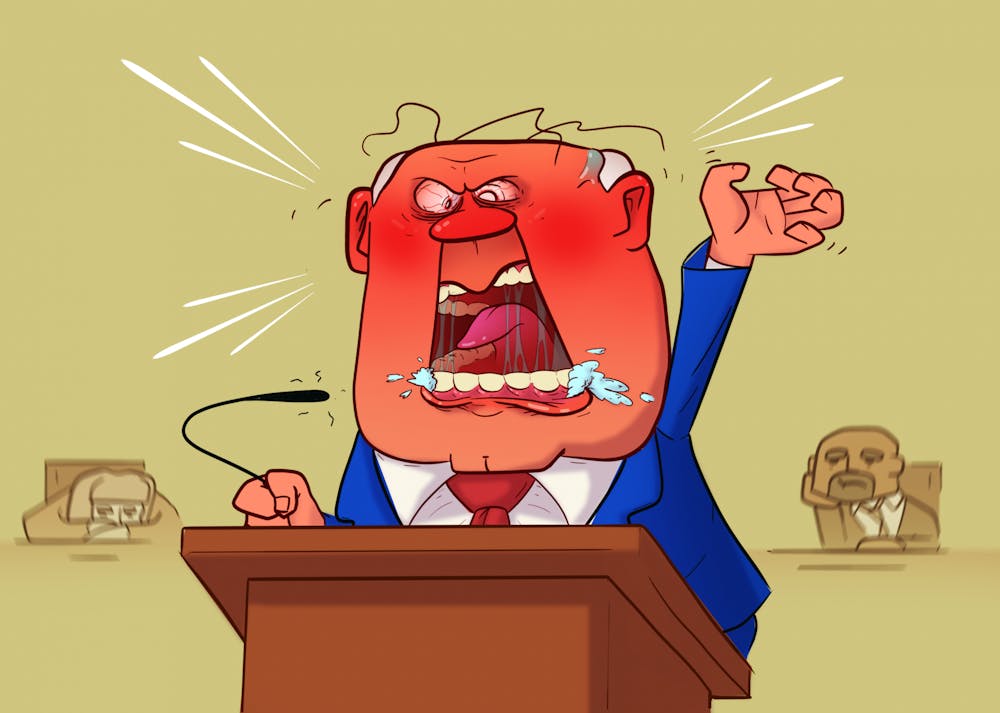In his first year in office, President Joe Biden’s legislative agenda is already facing difficulties passing through a closely divided U.S. Senate.
The difficulties are due, Biden says, in part to the filibuster, a long-standing tactic used by the minority party to prevent an item from coming to a vote in the Senate. Any senator who opposes the bill can talk for as long as they want, and it takes 60 votes to end debate.
With a 51-vote Democratic majority in the Senate, including a tie-breaking vote from Vice President Kamala Harris, the filibuster is a barrier to Democrats trying to pass a bill and a loophole for Republicans to prolong voting.
Mark Simpson, a political historian at ASU, said a number of Democrats are pushing to abolish the filibuster, arguing it halts legislation favored by the majority and bypasses popular will. But Simpson said it protects the minority party's rights to object potential legislation.
As the debate over filibuster reform takes center stage, ASU political science professors and historians, including Simpson, weighed in on the discussion.
History and purpose of the filibuster
The use of the filibuster in the U.S. dates back to the early 19th century, when Vice President Aaron Burr created it by mistake. In an effort to clean up Senate rules, Burr eliminated a rule that ended floor debates.
Then in 1917, the Senate adopted the rule of cloture, limiting the amount of time a senator can filibuster to prevent the power from being abused. Almost 60 years later, the Senate lowered the amount of votes needed to end cloture from a two-thirds vote to the current requirement of three-fifths, or 60 votes.
Simpson said rule changes around this time also ended the traditional "talking filibuster".
“(Now) it’s a lot easier to filibuster. As a senator, you can have one of your staff send an email saying ‘I’m filibustering’ and that’s it," he said. "Nobody has to stand and continue talking anymore."
Over time, the Senate has further reduced the filibuster's power, most notably its ability to block executive branch and judicial nominations, Simpson said.
In 2013, former Senate Majority Leader Harry Reid (D-Nev.) led the Senate to remove the filibuster for most presidential appointees. Then Republicans, led by Sen. Mitch McConnell (R-Ky.), eliminated the Senate filibuster on Supreme Court nominations four years later to confirm Justice Neil Gorsuch.
The debate over reform
Brooks Simpson, ASU Foundation professor of history , said pressure to abolish the filibuster has become more frequent in the last several decades.
“Both sides, when they’re in the minority, look for ways to obstruct the majority, and the majority looks for ways to circumvent the filibuster,” Brooks Simpson said. “It was very clear that once Democrats got control of the Senate ... Republicans, who at one time deplored the filibuster, would now embrace it as a way to block the agenda of the Biden administration."
Mark Simpson believes the filibuster should be reformed, but he has concerns about the effects of its elimination.
"It has been a useful tool to keep moderate presidential nominees and judicial nominees (from) going to these positions. If you get rid of the filibuster, the concern is it could lead to more extremists and more partisan hardliners going onto the courts," he said.
He also worries about the potential for sweeping legislation to be reversed when the minority becomes the majority.
“If you get rid of the filibuster for policy, it would make it much easier for Republicans, for example, to get rid of a policy like Obamacare,” he said. “That’s a major policy swing because you’d only need a simple majority vote at that point.”
Jesse Chanley, a political science lecturer at the College of Integrative Sciences and Arts and self-proclaimed "socialist democrat," rejects this argument, instead favoring elimination of the filibuster.
“If we actually did have majority rule, we would start getting policies that the majority wanted,” Chanley said. “Why would you want to switch that back ... if the majority are selecting policies that benefit most of us?"
Chanley believes the filibuster to be anti-democratic, citing its role in preventing the passage of civil rights legislation in the 1960s.
“The southern states were concerned about blocking any civil rights legislation that might benefit African Americans, so they included the filibuster,” he said. “Essentially what the filibuster does is allow minority rule, which is anti-democratic.”
Mark Simpson said the debate over the filibuster has "always been controversial because they’re not included in the Constitution."
“It’s not part of something that’s outlined as a specific aspect of how the Senate will function,” Mark Simpson said.
Implications for the future
Biden has indicated support for filibuster reform, advocating for a return to the traditional "talking filibuster." But some moderate Democrats oppose reform, including Sen. Kyrsten Sinema (D-Ariz.), who cites bipartisanship as a reason to keep it in place. Sen. Mark Kelly (D-Ariz.) is another moderate Democrat whose filibuster stance will be crucial for reform, but it is unclear whether he supports it or not.
Brooks Simpson said change will likely be dependent on the votes of senators like Sinema, as Congress faces another political dilemma.
“Either you facilitate the ability of the majority to get more things done, or you work at why such a polarized, extremist political environment makes bipartisanship impossible in the first place,” he said.
Reach the reporter at omccann1@asu.edu and follow @ocmccann on Twitter.
Like The State Press on Facebook and follow @statepress on Twitter.
Continue supporting student journalism and donate to The State Press today.




